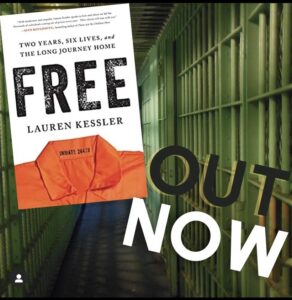Walk a mile in my shoes

As they enter the basement of the church, each person is handed a folder with a name printed on it. It is not their name. It is the name of a fictitious person whose identity they will assume this evening. The people filing in are local business owners, teachers, cops, social workers, university students. They are here to participate in a simulation that will challenge them to complete the set of reentry tasks that routinely face those just released from prison. The fictitious people whose identities they will assume are men, women, Black, white and brown, short-timers who’ve been in and out of county jail, Lifers who spent three decades behind bars.
The biographies may be contrived for the purpose of tonight’s exercise, but the tasks are real-world. This evening’s simulation is a “walk a mile in my shoes” exercise that is both harrowing and instructive, an hour-long immersion designed to both foster empathy and spur community action.
In all the folders handed out this evening are documents detailing the conditions of the individual’s parole, from required check-ins to drug tests to mandatory treatments. And all contain a list of tasks to be completed. The participant-parolees will have one hour to complete these tasks. That hour represents one month—the first month—following release. The simulation is divided into four timed fifteen-minute/ one-week segments.
A whistle blows to begin week one. Clutching their folders, the ersatz parolees rush—or try to rush—from table to table. These tables line the perimeter of the room, each representing a different service, from the Department of Human Services to the Department of Motor Vehicles, from a community health clinic to a resale clothing store. There’s a rental agency, credit union, a parole office, a job center, a church, a payday paycheck cashing establishment. Alcoholics Anonymous has a table.
Should they get their SNAP food benefits first? Apply for health insurance? Maybe they should cash that small “gate check” they found in their folder? A few go to the credit union desk but find the minutes ticking away as they are asked to fill out lengthy forms. Others make their way to the paycheck cashing desk. When asked to present their ID to cash the check, several discover that the drivers’ license they were given in the folder has expired. They rush to the DMV table. But there is a long line there. And as they are waiting to get to the front of the line, the clock runs out.
The whistle blows ending the first segment. During that first “week” hardly anyone managed to check in with their parole officer. No one looked for a job. No one had time to go to the clinic to fill prescriptions for necessary medication. No one was able go to an AA meeting or attend mandatory treatment.
The whistle begins segment two.
If you would like to know how they fared in segment two, three and four, I invite you to read my new book, Free: Two years, Six Lives and the Long Journey Home.
The simulation sets the stage for the reentry journeys of the six people you will meet, real folks, traveling the road from caged to free.
You will be amazed at the obstacles they face.
You will be more amazed at their resilience.







4 comments
I am so looking forward to reading this book. I have been to two of the simulations, they truly do put into perspective the many obstacles placed in the way of those experiencing reentry. It’s no wonder there are those who fail. More needs to be done to change this situation.
We need to work to bring the simulation here. I’m going to reach out to these folks (Madison, WI).
ALL of our politicians should complete that activity!! Looking forward to your new book, Lauren! I loved Grip of Time.
I could not agree more, Deborah. Politicians, parole officers, social services staff…ALL of us. btw, the simulated reentry month caused so much stress among participants that the organizers of the event had to have counselors available.
Leave a Comment